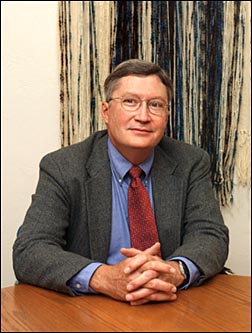|
|
|
|
|
August 29, 2003Teaching a priority for Girton
It's easy to tell Jack Girton loves teaching by the way his face lights up when he talks about the courses he has created and taught. The associate professor in biochemistry, biophysics, and molecular biology takes pride in presenting classes with new information that had not been published the previous year. And he gives essay tests to large graduate classes, even though grading them is a Herculean task, because he thinks that's the best way. It's no wonder then that one of the three priorities this new Faculty Senate president has for the coming year is discussion of teacher evaluations. The other priorities call for involvement in the budget and academic calendar, both appropriate for a faculty that officially shares governance of the university with the administration. Through shared governance, the faculty control the curriculum and set the quality of teaching, as well as the research and extension/outreach agendas, Girton said. "If you want a good university, hire good faculty, and if you want an outstanding university, hire outstanding faculty," Girton said. In the classroom "We need to take a careful look at how we evaluate and reward teaching. I think it's under-valued, especially in the promotion and tenure process," Girton said. Girton has the background to back his opinion. He spent five years on the senate's Judiciary and Appeals Committee, three as chair. During that time, he said he served as the closest thing the university has to an ombudsman. He estimates he was involved in 75 cases, many of them involving tenure denials. Under the relatively new promotion and tenure policy, faculty are to be evaluated on three activities: teaching, research and outreach/professional service, Girton said. Each faculty member has a position responsibility statement that spells out what the faculty member is expected to do and how much time should be devoted to each of the three. However, he added, putting the promotion and tenure policy into practice is difficult. "I don't think the administration has a good grasp of how to evaluate teaching," Girton said, adding most faculty don't either. For example, in two tenure cases he examined, a faculty member whose position was to be 60 percent research and 30 percent teaching received tenure, while a faculty member whose position was 60 percent teaching and 30 percent research didn't. When Girton inquired about the situation, he was told that the research expectations were the same for both faculty members, despite the heavier teaching load of one. "There's room for people of different talents," Girton said. "We need to not expect the same type of accomplishments of everyone." That's why as president-elect last year, Girton organized the spring faculty conference around the scholar-ship of teaching. He is writing a conference report that will recom-mend departments develop policy statements about how teaching will fit into their promotion and tenure policies. He would like those policies to be reviewed by the colleges, provost and university president. "Faculty should be able to go into teaching with confidence that they will meet the expectations of what the college wants," Girton said. "You need to know the rules before you start." Quantity vs. quality Girton said the time has come to make hard budget decisions. "In a time of declining budgets, we can continue to try to do a breadth of things and not do them as well, or we can make the decisions to do fewer things well," he said. "We've been deluding ourselves that we can continue to do both on declining funds," he added. "I want to make sure the faculty have a significant voice in the budget process this coming year," Girton said. "The faculty have to indicate what they think is important. We've had too many years of passively accepting budget cuts and saying we can get along." By now, he said, classes are bigger and quality is starting to suffer. Since the university is relying more on tuition to cover costs, budget decisions need to keep student education in mind. Girton noted good universities should offer topical courses, along with required courses, "but we don't have enough staff to even teach the required courses." Calendar discussion One of the first items on the senate agenda this year will be discussion of a new academic calendar. Last spring, a task force appointed by President Gregory Geoffroy developed four possible academic calendars. After gathering input from across campus, Geoffroy narrowed the options to two calendars. One is relatively unchanged from the current calendar. The second adds a week to winter break, includes a 10-day mini-semester and shortens the length of the academic semester. Geoffroy will seek more campus comment on the two options this fall before a final decision is made. The senate first called for a four-week break between fall and spring semesters in 2000. The current calendar has a three-week break. Senators have said a four-week break would provide faculty time to prepare for spring semester, engage in scholarship and proposal writing, and attend professional meetings. "The academic calendar relates to the traditional faculty role," Girton said. "We control the curriculum and the calendar is very central to that. One of the things we have to examine is how it will affect our ability to teach. Faculty take that role very seriously." The senate will meet at 7:30 p.m. Tuesday, Sept. 9, at The Hotel at Gateway Center. |
|
Ames, Iowa 50011, (515) 294-4111 Published by: University Relations, online@iastate.edu Copyright © 1995-2003, Iowa State University. All rights reserved. |
